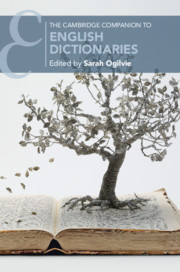Book contents
- The Cambridge Companion to English Dictionaries
- The Cambridge Companion to English Dictionaries
- Copyright page
- Dedication
- Contents
- Illustrations
- Tables
- Notes on Contributors
- Acknowledgements
- Chronology
- Chapter 1 Introduction
- Part I Issues in English Lexicography
- Part II English Dictionaries Throughout the Centuries
- Chapter 8 A Dictionary Ecosystem: Four Centuries of English Lexicography
- Seventeenth-Century English Dictionaries: Hard Words
- Eighteenth-Century English Dictionaries: Prescriptivism and Completeness
- Nineteenth-Century English Dictionaries: Descriptivism
- Chapter 13 The Making of American English Dictionaries
- Chapter 14 The Oxford English Dictionary
- Twentieth and Twenty-First-Century Dictionaries
- Part III Dictionaries of English and Related Varieties
- Guide to Further Reading
- Index
- Cambridge Companions to Literature
Chapter 13 - The Making of American English Dictionaries
from Nineteenth-Century English Dictionaries: Descriptivism
Published online by Cambridge University Press: 18 September 2020
- The Cambridge Companion to English Dictionaries
- The Cambridge Companion to English Dictionaries
- Copyright page
- Dedication
- Contents
- Illustrations
- Tables
- Notes on Contributors
- Acknowledgements
- Chronology
- Chapter 1 Introduction
- Part I Issues in English Lexicography
- Part II English Dictionaries Throughout the Centuries
- Chapter 8 A Dictionary Ecosystem: Four Centuries of English Lexicography
- Seventeenth-Century English Dictionaries: Hard Words
- Eighteenth-Century English Dictionaries: Prescriptivism and Completeness
- Nineteenth-Century English Dictionaries: Descriptivism
- Chapter 13 The Making of American English Dictionaries
- Chapter 14 The Oxford English Dictionary
- Twentieth and Twenty-First-Century Dictionaries
- Part III Dictionaries of English and Related Varieties
- Guide to Further Reading
- Index
- Cambridge Companions to Literature
Summary
Noah Webster’s first dictionary, A Compendious Dictionary of the English Language (1806) was the first significant dictionary by an American. His blue-backed speller, The American Spelling Book (1783) was already, after the Bible, the most popular book ever published in America. So his authority and reputation on matters linguistic were already firmly established in the public mindset by the time he published An American Dictionary of the English Language in 1828. It became a blueprint for how Americans might embrace their linguistic differences from Britain and use them to define a national identity. Webster’s dictionary beckoned a new era in national dictionaries beyond British shores. In addition, his lexicographic practice pioneered innovations in methodology that anticipated mainstream dictionary practice in twentieth-century America. This essay investigates Webster’s important contribution to English lexicography and the standardisation of American English, and compares it with the work of his competitor Joseph Worcester whose Comprehensive Pronouncing and Explanatory English Dictionary (1830) sparked vehement accusations of plagiarism in what became known as ‘the dictionary wars’. The chapter highlights the contribution of other American lexicographers such as Isaac Funk and Edward L. Thorndike, Willian Dwight Whitney, William A. Craigie, Calvert Watkins, Mitford M. Mathews, Frederic G. Cassidy, and Philip Gove.
Keywords
- Type
- Chapter
- Information
- The Cambridge Companion to English Dictionaries , pp. 157 - 169Publisher: Cambridge University PressPrint publication year: 2020

